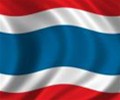

Thailand’s annual factory output growth slowed in July, when COVID-19 containment measures were imposed and extended into August in high-risk areas, as the Southeast Asian country deals with its biggest outbreak to date.
The measures in Bangkok and 28 other provinces, however, will be eased from Sept. 1, allowing more domestic travel, and malls and restaurants to reopen, to help its struggling economy.
The manufacturing production index (MPI) rose 5.12% in July from a year earlier, missing a forecast rise of 11% in a Reuters poll and against June’s 18.27% increase, the industry ministry said on Monday.
While the year-on-year growth was helped by a low base, the output index dropped 7% in July from the previous month, with capacity utilisation falling to 58.12% from 62.50% in June.
August output will still be impacted by restrictions but there should be a pickup next month, ministry official Thongchai Chawalitpichaet told a briefing.
“In September, there is a lockdown relaxation and more vaccines, the situation should improve and the MPI should be better,” he said.
Thailand’s vaccine rollout is slow, with only 11% of its more than 66 million population fully inoculated.
The manufacturing sector has also seen a migrant labour shortage, with outbreaks at factories adding to pressure and threatening exports, a rare bright spot in an economy badly hit by a collapse in tourism.
Industrial goods account for 80% of total exports.
In July, production of autos, electronics and rubber products increased but that of petroleum, hard disk drives and beer declined.
However, the ministry still expects the MPI to rise 4-5% this year, Thongchai said.
Source: Reuters (Reporting by Orathai Sriring, Kitiphong Thaichareon and Satawasin Staporncharnchai; Editing by Martin Petty)